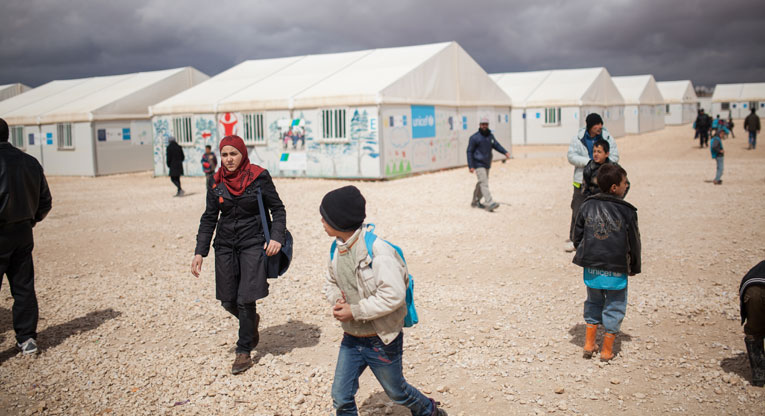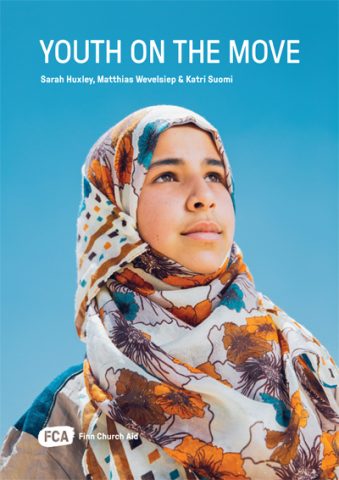When young people benefit, everyone benefits
FCA’s Youth on the Move -report encourages seeing young people all over the world as good and promising.
Have you ever sighed: Kids these days, or: What is the world coming to? Young people do not think like this. They look at the world ready to build their future, or with fear, without the opportunity to influence it. It is up to adults to decide how the situation of the world’s youth develops.
Right now, no one seems to know.
The world is undergoing big changes and is somehow out of place. Over the past two decades, there has been a great deal of progress. On the other hand, a new kind of instability is spreading, inequality is growing, streams of people are moving across borders, and the state of the environment is worsening. Human rights and the obedience to humanitarian law are strongly questioned. Trust in political and social institutions is declining.
In this changing world, there are 1.8 billion young people aged 15 to 24.
The percentage of young people is remarkable especially in countries with a great deal of poverty and uncertainty. Nine out of ten young people live in developing countries. The new FCA Youth on the Move report speaks particularly on the behalf of these young people. Youth have often been given little attention in aid work. It should not be like this.
Aid organisations must participate more in young people’s lives, listen to them, and renew their work to better include the youth. The new report provides suggestions on what the next steps could be.
Do not see youth as a threat
Youth are often seen as a threat. Society’s fears and hopes are projected onto youth. According to the FCA report, youth and young people’s activism should not be feared or constrained, but instead it should be seen how working on behalf of a cause develops responsibility and understanding.
Above all, youth should be provided with opportunities.
Youth means being in a constant movement. The movement takes place on the inside as well, as transitioning into adulthood turns the young person’s inner world upside down.
When young people are looking for education and an occupation, they are making big decisions. As opportunities for the world’s youth are not equal, for some youth means the acknowledgement of being disadvantaged and socially excluded.
Some of the world’s youth are on the move geographically, even across national borders. Ten percent of the world’s refugees are aged 15 to 24.
Refugee youth needs protection
The report emphasizes that refugee youth should be guaranteed protection and psycho-social support. For example in the large refugee camps in Bangladesh, FCA widens the possibilities for young women and teenage girls through education and protection.
Although acknowledging the rights of women and girls is a priority, men and boys should not be forgotten. Young boys in difficult circumstances need protection as well.

When the Syrian Hanani family fled from Syria to Jordan, they thought they would leave for a few weeks. Photo: Ville Asikainen.
”Give immigrants opportunities for personal development. It was hard to start from the beginning in a new country; I had no idea where to find work, or how and where to send applications.”
Response from the FCA Voices of the Youth questionnaire.
Education is a privilege
Finn Church Aid works on behalf of young people in all its countries of operation. What do young people hope from us?
The respondents to the UN My World questionnaire, seven million young people from 194 countries, considered high-quality education, health care, occupational security, and good government to be most important.
Youth living in a poor and unstable environment are much more often deprived from education and work than those in a stable environment. Many of the youth in the most fragile circumstances never get to go to school, and have to work in the grey economy in order to make a living. For these young people, education is a privilege. This has been noted by the FCA employees working with former serfs in Nepal. Education has opened up a new life for these young people.
Towards employment
So far, the education efforts of the international community and aid organisations have focused on access to basic education; now it is about the time to invest in the education of young people over 15 years.
The right of youth to get (back) to school, occupational training and higher education must be guaranteed. States must allow work permits to youth who are on the move.
An official certificate of education must be provided for the youth, valid in the country of residence or the country the person returns to. For example, in Uganda, refugees are able to get an entrepreneur degree in a training collaboratively organised by FCA and the Finnish organization Omnia Education Partnerships Oy.
Study counselling, cooperation with employers and internships should be used to ensure the link between education and employment. In order to create unity and avoid confrontation, it is also important to take into account the youth of the original population who are at risk of social exclusion, like in Jordan and Uganda, where FCA trains both immigrant and local youth.
Youth soon to be the majority
All youth should have the universal rights to organise, assemble, express their opinion, move freely, and participate in societal affairs. In reality, in many societies these rights are not realised.
However, in many countries where FCA works, young people either are or will soon be the majority that cannot be ignored.
Youth are ready to take action against the global phenomenon known as the shrinking space of the civil society, if we give them the chance to participate as active citizens.
For example, in Cambodia, the FCA youth network Changemaker Cambodia campaigns on behalf of the importance of education, encourages young people to take leadership, and helps them to get their voices heard in a society where young people do not traditionally have much of a say in decision-making even regarding their own life.
In Myanmar, FCA organises workshops on peace work for youth from different ethnic groups. In Kenya and Somalia, young people from different groups are brought together by inviting them to take part in projects of small-scale entrepreneurship.
Is the potential of youth on the move utilised? Many of them want to work, get to know the original population, and take advantage of the opportunities in the new country.
It is not just a cliché to say that youth are the future. If we advocate for the rights of the youth now, they will be able to build a world in which we can all lead a good life.
Text: Ulla Kärki
Translation: Leena Vuolteenaho
Illustrations: Emmi-Riikka Vartiainen
